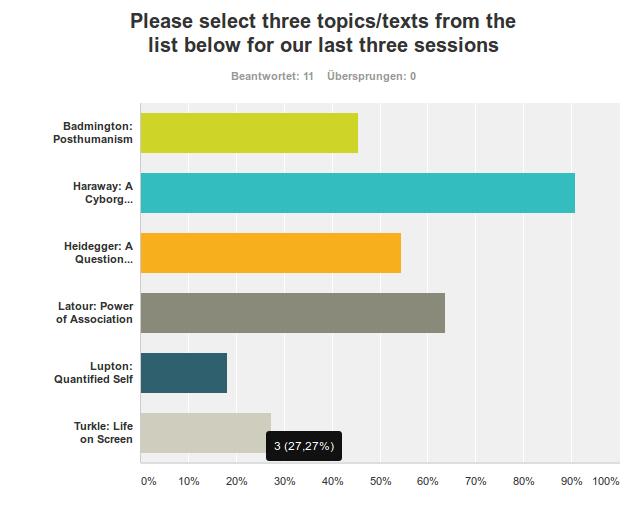Thank you all for voting for the texts we will read in our next three sessions. Sadly, Heidegger didn’t make the cut – he came third. This, however, gives posthumanism a chance, a topic I also look forward to.
Interestingly, these choices address one of the improvements you suggested – more diversity. We could hardly have found a more diverse set of texts and I hope we will enjoy it. Here is the order in which we will be reading them.
This text is somewhat of a classic in the area. Haraway connects feminist, socialist and technological ideas in order to come to a new idea of who we are/can be. It was written long before many of the technologies that we use every day became common place but already shows great insight into the possibilities digitization has created since the 1960ies. We may also find some unlikely parallels to the Zapatistas.
Latour is a sociologist and founding figure of what has become known as ANT (Actor-network-theory), a somewhat sidelined and – according to its proponents misnamed – strand of Science and Technology Studies. The innovation here, in short, lies in conceptualizing objects as actors and analyzing networks of actors, human and non-human, also called associations. This raises some interesting perspectives. The text I propose focuses on power and associations and may offer some interesting additions to the power debates we have already had in class.
Posthumanism might – or might not – be something to look out for. It has been discussed as one of the conceptions that challenge modern notion of humanism and human nature. Badmington’s article places post-humanism in context to postmodern thought and would allow us to discuss the idea in relation to our earlier readings. I welcome the opportunity to dive into something I haven’t worked on a lot.
On Wednesday, you will find a post on the first text – Haraway’s Cyborg Manifesto.
Tags: cyborgs, Haraway, Latour, Posthumanism, reading, technology


 Die
Die